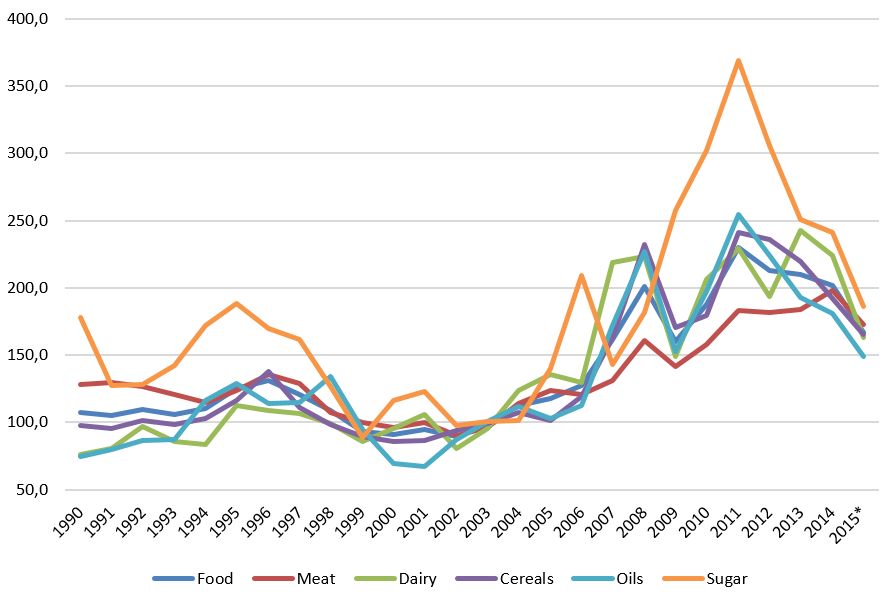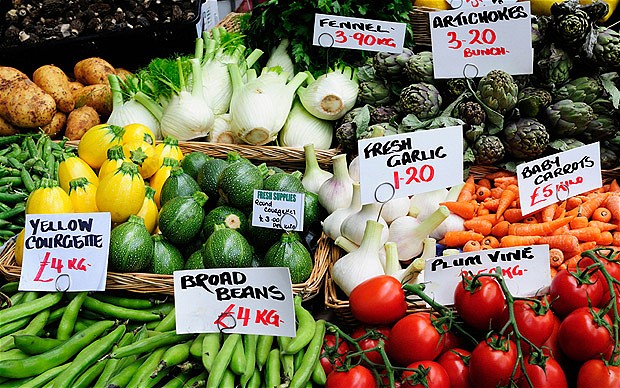The FAO Food Price Index averaged 156.3 points in September 2015 which is almost 20% less than a year ago. Last month’s 155.7 points were actually the lowest value of the index in the last seven years.
The FAO Food Prices index tracks international market prices for cereals, meat, dairy products, vegetable oils and sugar. As the following figure shows, prices of each of these are moving downwards in the short run, though they increased by 50-100% on a 2002-2004 basis.
FAO Food Price Index for 1990-2015 (2002-2004=100)

Values for 2015 are coming from January-September averages.
Source: Own composition based on FAO (2015) data
FAO suggests that reasons behind are ample supplies, a slump in energy prices and concerns over China’s economic slowdown.… Read the rest
Is selling 'experiences' a potential growth path for European agriculture?
Three researchers at Leuven University, Jo Swinnen, Kristine Van Herck and Thijs Vandermoortele, in a recent paper in the newly-launched BAE Bio-based and Applied Economics journal put the spotlight on the potential to base future growth in European agriculture on the willingness of consumers to pay a price premium in exchange for various ‘experiences’ (working paper version available here ). They suggest that this may be a more promising growth strategy, at least in some sectors or for some regions, than a more conventional emphasis on producing food, albeit of high quality, at low cost.
Definition of experience goods
The researchers base their proposal on two pieces of evidence.… Read the rest
New BBC documentary series: The Future of Food
Last night, BBC2 screened the first of six hour-long episodes in a new documentary series, The Future of Food.
 … Read the rest
… Read the rest
Big Phil Lays It On The Line
Vaasa, Finland: Philip Lowe is a leading figure in the rural studies community in the UK and he issues a stark warning about the so-called ‘new productivism’ in an interview that was issued to delegates at the ESRS Congress where he gave the opening plenary.… Read the rest
The Commission Communication on agricultural product quality policy
The Commission this week produced a Communication on how it proposes to develop and advance agricultural product quality policy in the EU. The Communication is the product of an extensive consultation process which began in 2006 with a stakeholder hearing, followed by a conference in Brussels in February 2007. This in turn led to a Green Paper consultation in 2008 and a High Level Conference on Agricultural Product Quality held in Prague in March 2009.… Read the rest
Prospects for GMO products in the EU
After the forceful and successful management of the agricultural dossier by the French Presidency in the second half of 2008, it was inevitable that the agenda for the Czech Presidency would be a light one, and this is also reflected in the activity level for this blog since the beginning of this year.
Nonetheless, even in a context where most attention is focused on dealing with the financial crisis and the strengthening recession hitting Europe, Europe’s agricultural and food industries continue to be required to address regulatory issues affecting the governance of the sector. One of these issues concerns the regulatory environment for genetically modified products (GMPs), and I am indebted to EurActiv for drawing my attention to the outcome of a meeting of the Environmental Council in early December which gave a series of political directions to the Commission on this issue.… Read the rest
The methane menace and hamburgers
A paper on the contribution to climate change of livestock methane emissions has found that the problem is likely to get worse as global demand for meat and dairy products increases. Dr Andy Thorpe, an economist at Portsmouth University, found that a single herd of 200 cows can produce annual emissions of methane roughly equivalent in energy terms to driving a family car 180,000 km.… Read the rest
CAP killer?
We’re used to the arguments that the CAP’s subsidies and tariffs are very bad for many desperately poor farmers in the developing world, with some going as far as to say that the EU has blood on its hands but now comes a piece of medical research which suggests that EU farm subsidies are responsible for more than ten thousand diet-related deaths among European citizens. … Read the rest
Bureaucracy, greed and vanity threaten EU plan to help world's poorest farmers
The European Commission has published its plans to divert up to a billion euros from CAP underspends to a new fund to help farmers in the developing world to increase productivity in the face of the world food crisis. Higher food prices have meant lower CAP expenditure on market measures such as intervention, storage and export refunds and the Commission has suggested redirecting parts of these savings to agricultural production in the third world. Commission President José Manuel Barroso, Development Commissioner Louis Michel and Farms Commissioner Mariann Fischer-Boel have all spoken enthusiastically about the idea, but there are growing rumblings of opposition, from both the Council and the Parliament, both of which will have to approve the plan if it is to become a reality.… Read the rest
Bureaucracy, greed and vanity threaten EU plan to help world’s poorest farmers
The European Commission has published its plans to divert up to a billion euros from CAP underspends to a new fund to help farmers in the developing world to increase productivity in the face of the world food crisis. Higher food prices have meant lower CAP expenditure on market measures such as intervention, storage and export refunds and the Commission has suggested redirecting parts of these savings to agricultural production in the third world. Commission President José Manuel Barroso, Development Commissioner Louis Michel and Farms Commissioner Mariann Fischer-Boel have all spoken enthusiastically about the idea, but there are growing rumblings of opposition, from both the Council and the Parliament, both of which will have to approve the plan if it is to become a reality.… Read the rest


